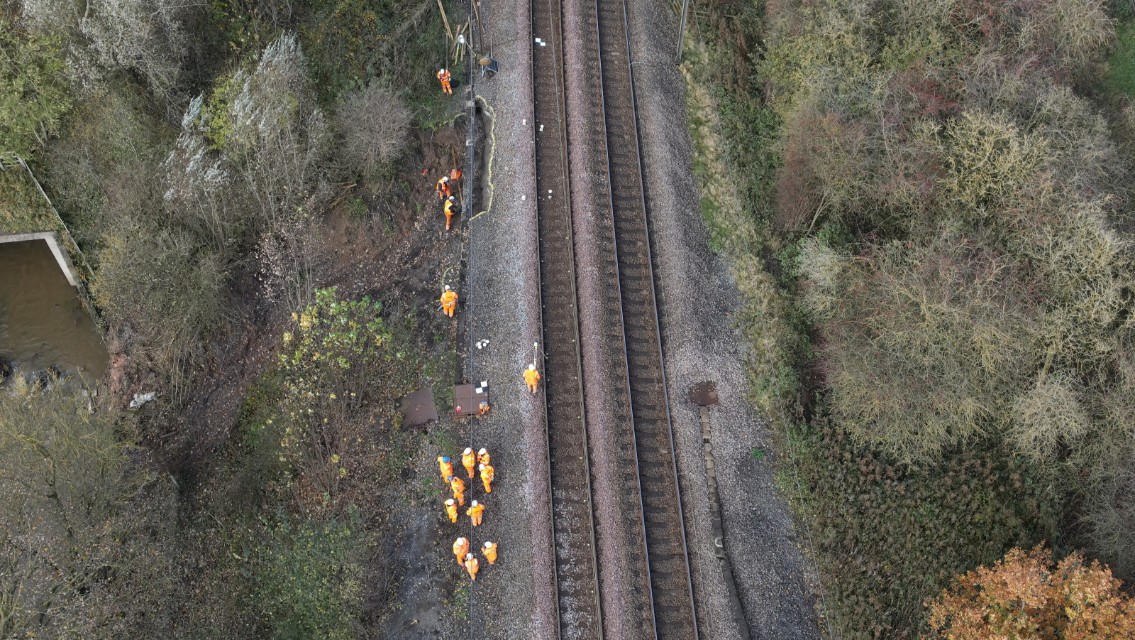Wednesday 3 Apr 2024
Network Rail to spend £22m across East Coast route to tackle disruption brought by landslips
- Region & Route:
- Eastern
- | Eastern: East Coast
Network Rail is to spend £22m on improving drainage on the rail network across its East Coast route to help prevent major disruption brought to passengers by landslips and heavy rain, and to increase safety.
Over the past year, there have been multiple incidents of landslips and flooding across the East Coast route, including at Aycliffe, near Darlington, as well as between Newark and Grantham, causing major disruption to passengers and communities.
These incidents can potentially be dangerous as well as expensive and time consuming to resolve.
April marks the start of Network Rail’s latest five-year control period (funding cycle) and £22m is earmarked for investment to improve drainage on the East Coast route to help prevent incidents such as these.
The funding will allow renewal and refurbishment projects to be carried out on earthwork assets across the route, along with an enhanced monitoring and maintenance programme of drainage systems.
Proactive climate-resilience work is currently taking place at Browney Curve near Durham, where Network Rail engineers are working to stabilise over 1km of land next to the East Coast Main Line, making sure that train services can run reliably and safely for years to come.
One-in-three Britons live within 20 minutes of an East Coast station. The route serves 66 locations including major East Coast Main Line hubs at King’s Cross, York, and Newcastle, as well as commuter stations including Biggleswade, Royston, and Chester-Le-Street.
Over the next five years, the route will spend £2.8bn on the day-to-today running of the railway and a widespread programme of renewals and upgrades on the network, improving the experience of passengers as they travel by train.
With this funding, the East Coast route is committed to delivering a safe and reliable railway for our passengers, and targeting key performance improvements which will improve passenger experience.
The route will see £285m spent on the East Coast Digital Programme upgrading the southern end of the East Coast Main Line to digital signalling, leading to more reliable and greener journeys for passengers, as well as hundreds of kilometres of track renewed to enhance safety and network resilience.
Paul Rutter, Route Director for Network Rail’s East Coast route, said: “Over the next five years, we are committed to making the rail network across our route better for all our passengers.
“Climate change is an ever-increasing problem for our aging infrastructure, but we are proactively working to tackle the issue and improve the reliability and resilience of our network.
“We are carrying out major proactive climate-resilience work to enhance our railway and make journeys safer for passengers, and we will be improving our monitoring of our drainage assets.
“We will also be carrying out major improvements to track, switches & crossings, the equipment used for trains to cross from one track to another, signals, level crossings, and more to improve train performance and increase reliability for passengers."
Nationally, Network Rail has announced the start of its £45.4bn rail improvement plan aimed at delivering a simpler, better, greener railway, with major plans to tackle the extremes of climate change.
Contact information
Passengers / community members
Network Rail national helpline
03457 11 41 41
Latest travel advice
Please visit National Rail Enquiries
Journalists
Joshua Chapman
Media Relations Manager
Network Rail
joshua.chapman@networkrail.co.uk
About Network Rail
We own, operate and develop Britain's railway infrastructure; that's 20,000 miles of track, 30,000 bridges, tunnels and viaducts and the thousands of signals, level crossings and stations. We run 20 of the UK's largest stations while all the others, over 2,500, are run by the country's train operating companies.
Usually, there are almost five million journeys made in the UK and over 600 freight trains run on the network. People depend on Britain's railway for their daily commute, to visit friends and loved ones and to get them home safe every day. Our role is to deliver a safe and reliable railway, so we carefully manage and deliver thousands of projects every year that form part of the multi-billion pound Railway Upgrade Plan, to grow and expand the nation's railway network to respond to the tremendous growth and demand the railway has experienced - a doubling of passenger journeys over the past 20 years.
Follow us on Twitter: @networkrail
Visit our online newsroom: www.networkrailmediacentre.co.uk

